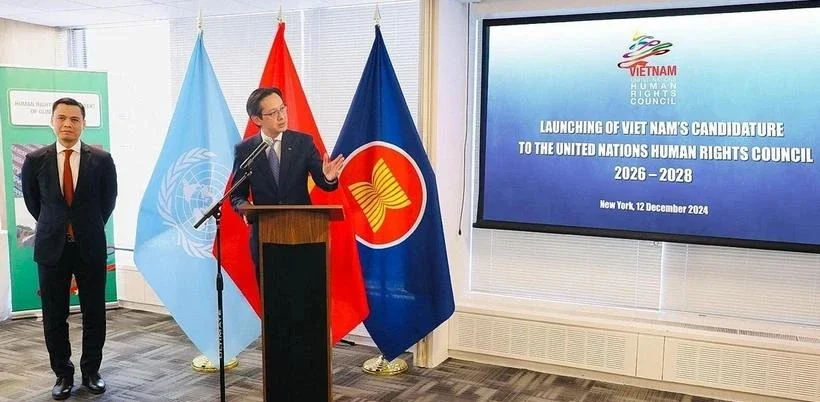WNAM REPORT: Sabina Stein, Head of Governance & Participation, UNDP in Vietnam, has recently penned an article, lauding Vietnam’s engagement in international human rights instruments and cooperation.
Her writing follows.
On this International Human Rights Day, as global crises and growing disregard of international law drive mass human rights violations, it is vital that we reaffirm the value of international human rights instruments and cooperation. These mechanisms, rooted in the Universal Declaration of Human Rights (UDHR) – adopted 76 years ago today – continue to provide a vital framework for protecting human rights and fostering multilateral dialogue. Vietnam’s engagement with these mechanisms stands as a testament to the enduring relevance of international human rights cooperation.
Vietnam has ratified seven of the nine core international human rights instruments, including the UN Convention against Torture and Other Cruel, Inhuman or Degrading Treatment or Punishment (UNCAT), which today, December 10, also celebrates its 40th anniversary. By ratifying these treaties, Vietnam has committed to aligning its national frameworks with international norms and to engaging in regular review processes.
The year 2025 will bring many opportunities for engagement, as Vietnam is scheduled to present before several key treaty bodies supporting the conventions’ implementation. In March, it will engage with the Committee on the Rights of Persons with Disabilities (CRPD), followed by a review before the Human Rights Committee under the International Covenant on Civil and Political Rights (ICCPR) in July. Later in the year, Vietnam will appear before the Committee on the Elimination of All Forms of Discrimination Against Women (CEDAW) in October.
These reviews are essential moments of reflection, allowing for an honest assessment of progress and gaps. UNDP welcomes Vietnam’s active engagement in these processes, which are resource intensive exercises. Such cooperation is even more meaningful in today’s context, when so many are questioning the rules-based order and multilateral cooperation to advance common values.
One of the clearest signs of Vietnam’s openness to human rights cooperation is its engagement with the Universal Periodic Review (UPR). During the 4th UPR cycle, completed in October this year, Vietnam accepted 271 out of 320 recommendations—an 85% acceptance rate—with 253 recommendations fully accepted. This demonstrates the country’s readiness to engage constructively in human rights dialogue with the international community.
Accepting recommendations is only the first step. The most critical task is turning them into tangible actions that improve lives. To this end, Vietnam is currently developing a National Master Plan for the 4th UPR, which will guide implementation over the next five years. Building on the previous Master Plan from the 3rd UPR, the new plan must be ambitious, actionable, and measurable. It should define clear responsibilities in line with new government structures, as well as budgets, timelines, and monitoring and evaluation indicators.
This process will only succeed if it is inclusive and consultative. Involving diverse stakeholders, including socio-political organizations, communities, and NGOs, will ensure that the plan responds to the needs of all communities. UNDP stands ready to support this effort.
UNDP has recently also supported Vietnam’s engagement with the UN Committee Against Torture (CAT). Following the Government’s submission of its second periodic report earlier in 2024, UNDP facilitated a visit by Vietnam’s Ministry of Public Security (MPS) to Geneva. Meeting with CAT members, the Office of the High Commissioner for Human Rights, the International Committee of the Red Cross and the Swiss Government focused on best practices to advance UNCAT implementation.
More recently, UNDP and MPS facilitated workshops for central and local law enforcement officials in Hanoi and Ho Chi Minh City on the UNCAT, reaching around 140 participants. The workshops focused on Committee recommendations to Vietnam to further the Convention’s implementation.
Vietnam’s role as a member of the UN Human Rights Council (2023–2025) is another indication of its commitment to international cooperation. During its mandate, Vietnam has sponsored resolutions commemorating the 70th anniversary of the UDHR and calling for a human rights-based approach to climate action. Looking ahead, Vietnam has announced its candidacy for a second term on the Human Rights Council (2026–2028), signaling its intent to remain an engaged member of the international human rights system.
UNDP also highlights the value of the 2024 visit of the Special Rapporteur on the right to development to Vietnam and encourages future visits of relevant mandate holders to the country to deepen dialogue and cooperation between the Government and UN human rights mechanisms.
The enduring value of international human rights cooperation
Amid widespread human rights violations around the world, it is natural to question the effectiveness of international human rights instruments. Yet history teaches us that the path to justice is rarely linear, and the work is never truly finished. No single tool can resolve all challenges, and human rights instruments are no exception. But the choice before us is clear: we can continue to strengthen a rules-based order — however imperfect — or risk sliding into a lawless world devoid of shared frameworks for cooperation and the protection of the most vulnerable.
Despite the challenges, on this Human Rights Day, we welcome Vietnam’s engagement in international human rights mechanisms, as a signal that there is worth in preserving and participating in a rights-based order.
Turning commitments into action requires political will, clear roadmaps, and the resources to back them up. UNDP stands ready to support Vietnam in these efforts, from legislative and institutional reform to the development and implementation of an ambitious UPR Master Plan. Our partnership is built on trust and a commitment to inclusive, human-centered development.


